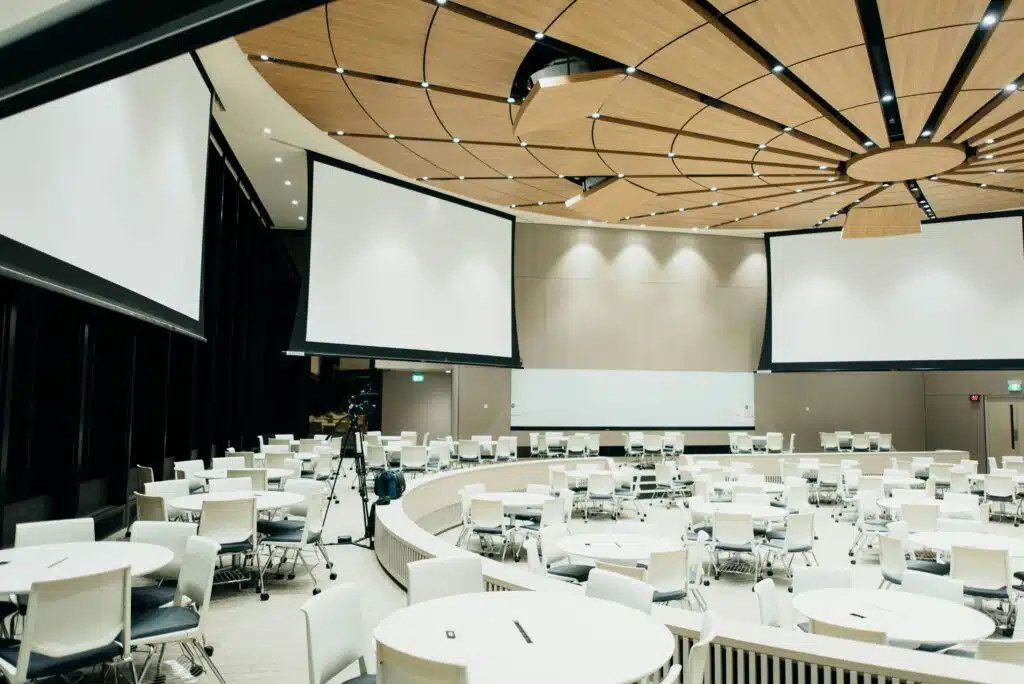Corporate event planning involves a lot of moving parts, including selecting a venue, creating a budget, coordinating vendors, and marketing the event to your target audience. It’s crucial to approach each step with meticulous attention to detail to ensure that everything runs smoothly on the big day. Additionally, you’ll need to tailor your event to your audience to ensure that it meets their needs and expectations. With careful planning and execution, you can create an event that leaves a lasting impression on your guests and helps you achieve your business goals.
Understanding Corporate Events
Corporate events are an essential part of the business world. They are occasions when companies bring together employees, clients, and partners to achieve a variety of objectives. Understanding the different types of corporate events and their key objectives can help you plan a successful event that meets your company’s needs.
Types of Corporate Events
There are many different types of corporate events, each with its own purpose and format. Some of the most common types of corporate events include:
- Corporate Social Events: These events are designed to bring people together in a social setting. They can include holiday parties, company picnics, and other informal gatherings.
- Corporate Meetings: These events are designed to facilitate communication and collaboration within a company. They can include team meetings, departmental meetings, and company-wide meetings.
- Business Events: These events are designed to promote a company’s products or services. They can include trade shows, product launches, and other promotional events.
Key Objectives of Corporate Events
The key objectives of corporate events can vary depending on the type of event. However, some of the most common objectives include:
- Networking: Corporate events provide an opportunity for people to meet and connect with others in their industry. This can help build relationships, generate leads, and facilitate collaboration.
- Education and Training: Corporate events, whether they are virtual events or in-person seminars, can be used to provide employees with training and education opportunities. This can help improve their skills and knowledge, which can benefit the company.
- Team Building: Corporate events can be used to promote teamwork and collaboration among employees. This can help improve morale and productivity.
- Celebration: Corporate events can be used to celebrate company achievements, milestones, and successes. This can help boost employee morale and promote a positive company culture.
In conclusion, understanding the different types of corporate events and their key objectives is crucial for planning a successful event. Whether you are planning a corporate social event, a business event, or a corporate meeting, keeping these objectives in mind can help you achieve your goals and create a memorable experience for your attendees.
Corporate Event Planning Process
Planning a corporate event can be a daunting task, but with the right approach, you can ensure a successful event. The planning process involves several critical steps that require careful consideration and attention to detail. This section will guide you through the planning process and provide you with the tools you need to plan a successful corporate event.
Initial Considerations
Before you start planning your corporate event, there are a few initial considerations to keep in mind. First, you need to determine the purpose of the event and what you hope to achieve. This will help you determine the type of event you want to plan and the target audience you want to target. You should also consider the date and location of the event, as well as the budget you have available.
Event Budget Planning
One of the most crucial aspects of corporate event planning is budget planning. You need to determine how much money you have available for the event and allocate it wisely. This involves creating a budget that includes all the necessary expenses, such as venue rental, catering, entertainment, and decorations. You should also consider any additional expenses that may arise, such as unexpected costs or last-minute changes.
In conclusion, the planning process is a crucial step in ensuring a successful corporate event. By considering the initial considerations, using a planning checklist, and budget planning, you can create a tailored and elegant event that meets your goals and exceeds your expectations.
Event Management Essentials to Make Your Next Corporate Event Successful
When planning a corporate event, there are several key elements that must be considered to ensure its success. In this section, we will cover the essentials of event management, including corporate event management software, a team of corporate event planners, and event venue selection.
Corporate Event Management Software
Corporate event management software can be an essential tool for managing all aspects of your event, from planning to execution. This software can help you keep track of important details such as attendee lists, vendor information, and event schedules. It can also help you manage your budget and track expenses, as well as provide real-time analytics to help you measure the success of your event.
Team of Corporate Event Planners
A team of corporate event planners can be a valuable asset when planning a large-scale event. These professionals can help you navigate the complexities of event planning, from selecting the right venue to coordinating with vendors and managing logistics. A team of event planners can also help you stay on top of important deadlines and ensure that everything runs smoothly on the day of the event.
Event Venue Selection
Selecting the right venue for your event is crucial to its success. When choosing a venue, consider factors such as the size of the space, its location, and its amenities. You should also consider the needs of your attendees and choose a venue that is easily accessible and convenient. Finally, make sure that the venue you choose is within your budget and can accommodate all of your event’s requirements.
In conclusion, when planning a corporate event, it is important to have a clear understanding of the essentials of event management. By utilizing corporate event management software, hiring a team of corporate event planners, and carefully selecting your event venue, you can ensure that your event is a success.
Event Technology and Tools

When it comes to corporate event planning, event technology and tools can make a significant difference in the success of your event. In this section, we’ll discuss two key areas of event technology: event apps and hybrid event solutions.
Event Apps
Event apps are mobile applications designed to help attendees navigate and engage with your event. They can be used for everything from registration and ticketing to scheduling and networking. By providing attendees with a mobile app, you can create a more engaging and interactive experience that is tailored to their needs.
One popular event app is Social Tables, which provides a suite of tools to help event planners manage everything from seating arrangements to event check-in. With Social Tables, you can create floor plans, manage guest lists, and even design custom event diagrams.
Hybrid Event Solutions
Hybrid events are events that combine both in-person and virtual components. They allow you to reach a broader audience while still providing the benefits of face-to-face interaction. To make your hybrid event a success, you’ll need a variety of tools and technologies.
One option is a mobile event app that allows virtual attendees to participate in live polls, Q&A sessions, and other interactive elements. Another option is a live streaming platform that allows you to broadcast your event to a wider audience.
Overall, event technology and tools can help you create a more engaging and interactive experience for your attendees. By harnessing the power of event apps and hybrid event solutions, you can supercharge your event and make it a success.
Promotion and Engagement
To ensure the success of your corporate event, it is crucial to focus on promotion and engagement. This section will cover two essential subtopics: Marketing Your Event and Engaging Attendees.
Event Marketing (Promote Your Event!)
Marketing your event is vital to attract potential clients and attendees. Creating a buzz around your event can help generate interest and increase attendance. One of the most effective ways to market your event is to create a dedicated event website. Your event website should be tailored to your event, providing all the necessary information, including the date, time, location, and agenda. Make sure to optimize your website for search engines and include social media sharing buttons to help spread the word.
Another way to market your event is by utilizing social media platforms. Create social media accounts for your event and post regular updates, teasers, and behind-the-scenes content to keep your followers engaged. Utilize paid advertising options to reach a wider audience and target potential clients.
Engaging Attendees
Engaging attendees is crucial to ensure a successful event experience. Attendees should feel connected to your event and have a memorable experience. One way to engage attendees is by offering interactive activities, such as workshops, games, and contests. Providing opportunities for attendees to network and connect with others can also help create a sense of community.
Another way to engage attendees is by utilizing technology. Consider incorporating a mobile app or event platform that allows attendees to connect with each other, access event information, and participate in live polls and surveys. This can help create a more personalized and tailored event experience.
In conclusion, promoting and engaging attendees is crucial to ensure the success of your corporate event. By utilizing effective marketing strategies and engaging attendees through interactive activities and technology, you can create a memorable event experience that leaves a lasting impression.
Execution and On-site Management

Once you have planned and organized all aspects of your corporate event, it’s time to focus on the execution and on-site management. This is where all your hard work comes to fruition, and your event staff will play a crucial role in ensuring a successful event.
Event Staff and Logistics
Your event staff will be responsible for managing logistics and ensuring that everything runs smoothly on the day of the event. They will need to be well-trained, knowledgeable, and able to think on their feet. It’s crucial to have a clear chain of command and designated roles for each member of the team. This will help to avoid confusion and ensure that everyone knows what they are responsible for.
It’s also important to have contingency plans in place for any unforeseen circumstances that may arise. This includes having backup equipment, such as microphones and projectors, and having a plan in place for inclement weather. By being prepared for any eventuality, you can ensure that your event runs smoothly and that your guests have a positive experience.
Day-of Event Coordination
On the day of the event, it’s essential to have a clear plan for how everything will be set up and managed. This includes ensuring that all equipment is set up correctly and that the venue is ready to receive guests. It’s also important to have a point person who is responsible for coordinating all aspects of the event, including managing the event staff, ensuring that the schedule is being followed, and dealing with any issues that arise.
Throughout the day, it’s important to keep a close eye on how everything is going and to make adjustments as needed. This could include adjusting the schedule if things are running behind or changing the layout of the venue to accommodate unexpected issues. By being flexible and adaptable, you can ensure that your event is a success and that your guests have a positive experience.
In conclusion, successful event planning requires meticulous attention to detail and careful planning leading up to the event. However, the execution and on-site management are just as crucial to the event planning success. With the power of your event staff and being prepared for any eventuality, you can supercharge your event and unlock its full potential.
Post-Event Evaluation
Once your successful corporate event has come to a close, it’s important to gather feedback to ensure your event is even better for the next event. The post-event evaluation is a crucial step in planning a successful upcoming event. In this section, we’ll explore how to gather feedback and measure the success of your event.
Gathering Feedback
To gather feedback, it’s important to create a survey that asks specific questions about your event. You can use online survey tools or create your own survey using a platform like Google Forms. Make sure to tailor your questions to your event’s goals and objectives. For example, if your goal was to increase attendee engagement, you may want to ask questions about the attendee experience and how engaged they felt during the event.
During the survey creation process, it’s important to keep in mind the timing of the survey to gather actionable feedback from your target audience. You don’t want to send the survey too soon after the event, as attendees may still be processing their experience. However, you also don’t want to send the survey too late, as attendees may have forgotten important details about the event.
Measuring Event Success
Measuring the success of your event can be done by analyzing the feedback gathered from your post-event survey. Some key metrics to look at include attendee satisfaction, engagement, and overall event experience. You can also look at metrics like attendance rate, social media engagement, and revenue generated from the event.
By analyzing these metrics, you can identify areas of improvement for your next event. For example, if attendees reported low engagement levels, you may want to consider adding more interactive elements to your next event to increase engagement.
In conclusion, the post-event evaluation is a crucial step in planning a successful corporate event. By gathering feedback and measuring event success, you can ensure that your next event is even better than the last.
